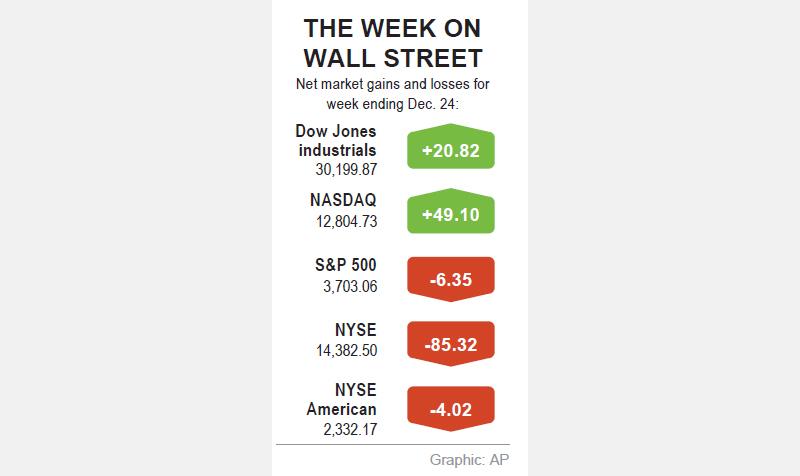The S&P 500 ended higher at the close of a shortened session on Thursday as investors headed into the long Christmas weekend with hopes that an imminent stimulus agreement, a Brexit deal and a COVID-19 vaccine rollout will spell brighter days in the coming year.
All three major US stock indices ended in positive territory.
For the holiday-shortened week, the S&P 500 edged down 0.2 percent, the Dow Jones Industrial Average eked out a 0.07 percent gain and the NASDAQ Composite advanced 0.4 percent.

While stocks tend to perform well in the closing days of December, a phenomenon known as the Santa Claus rally, the resurgent COVID-19 pandemic and upcoming US Senate runoffs in Georgia have clouded the outlook this year.
The US House of Representatives blocked US President Donald Trump’s attempt to change a US$2.3 trillion coronavirus relief and government spending package after Trump insisted on US$2,000 direct payments to Americans.
The move cast doubt as to whether the package passed by the US Congress on Monday would be signed into law and raised the threat of a partial government shutdown.
“If [stimulus] doesn’t get passed in some form or another it could mean severe consequences for the unemployed,” said Peter Cardillo, chief market economist at Spartan Capital Securities LLC in New York.
The UK reached a trade deal with the EU after months of negotiations, just days before leaving one of the world’s largest trading blocs.
“[The Brexit deal] might be acting as a buffer for the market in the sense that it’s counteracting the negativity of the stimulus bill being stalled,” Cardillo added.
More than 1 million Americans have been vaccinated against COVID-19 even as the pandemic continues to rage in the US and leaders moved to guard against a more contagious variant of the disease sweeping across the UK.
The Dow Jones Industrial Average on Thursday rose 70.04 points, or 0.23 percent, to 30,199.87, the S&P 500 gained 13.05 points, or 0.35 percent, to 3,703.06 and the NASDAQ Composite added 33.62 points, or 0.26 percent, to 12,804.73.
Ten of the 11 major sectors of the S&P 500 posted gains, led by real estate. Energy was the lone loser.
Shares of Alibaba Group Holding Ltd (阿里巴巴) dropped 13.3 percent on news that China had launched an investigation into the company as part of its antitrust crackdown.
American Airlines Group Inc said it was moving forward with plans to recall furloughed workers, even as forthcoming payroll protections, part of the stimulus package, was called into doubt. Its shares dipped 1.4 percent.
Moderna Inc said that it expects its COVID-19 vaccine to be effective against a new variant of the disease discovered in the UK. Even so, its shares closed down 5.3 percent.
Altimmune Inc slipped 9.3 percent after the US Food and Drug Administration issued a clinical hold on the company’s application to begin human testing of its single-dose COVID-19 vaccine, AdCOVID.
Advancing issues outnumbered declining ones on the New York Stock Exchange by a 1.53-to-1 ratio; on NASDAQ, a 1.08-to-1 ratio favored decliners.
The S&P 500 posted seven new 52-week highs and no new lows; the NASDAQ Composite recorded 138 new highs and five new lows.
Volume on US exchanges was 6.14 billion shares, compared with the 11.30 billion average over the past 20 trading days.

Among the rows of vibrators, rubber torsos and leather harnesses at a Chinese sex toys exhibition in Shanghai this weekend, the beginnings of an artificial intelligence (AI)-driven shift in the industry quietly pulsed. China manufactures about 70 percent of the world’s sex toys, most of it the “hardware” on display at the fair — whether that be technicolor tentacled dildos or hyper-realistic personalized silicone dolls. Yet smart toys have been rising in popularity for some time. Many major European and US brands already offer tech-enhanced products that can enable long-distance love, monitor well-being and even bring people one step closer to

Malaysia’s leader yesterday announced plans to build a massive semiconductor design park, aiming to boost the Southeast Asian nation’s role in the global chip industry. A prominent player in the semiconductor industry for decades, Malaysia accounts for an estimated 13 percent of global back-end manufacturing, according to German tech giant Bosch. Now it wants to go beyond production and emerge as a chip design powerhouse too, Malaysian Prime Minister Anwar Ibrahim said. “I am pleased to announce the largest IC (integrated circuit) Design Park in Southeast Asia, that will house world-class anchor tenants and collaborate with global companies such as Arm [Holdings PLC],”

Sales in the retail, and food and beverage sectors last month continued to rise, increasing 0.7 percent and 13.6 percent respectively from a year earlier, setting record highs for the month of March, the Ministry of Economic Affairs said yesterday. Sales in the wholesale sector also grew last month by 4.6 annually, mainly due to the business opportunities for emerging applications related to artificial intelligence (AI) and high-performance computing technologies, the ministry said in a report. The ministry forecast that retail, and food and beverage sales this month would retain their growth momentum as the former would benefit from Tomb Sweeping Day

Thousands of parents in Singapore are furious after a Cordlife Group Ltd (康盛人生集團), a major operator of cord blood banks in Asia, irreparably damaged their children’s samples through improper handling, with some now pursuing legal action. The ongoing case, one of the worst to hit the largely untested industry, has renewed concerns over companies marketing themselves to anxious parents with mostly unproven assurances. This has implications across the region, given Cordlife’s operations in Hong Kong, Macau, Indonesia, the Philippines and India. The parents paid for years to have their infants’ cord blood stored, with the understanding that the stem cells they contained